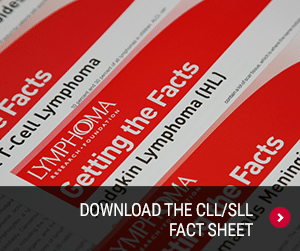
What is Lymphoma?
Home » Understanding Lymphoma » About Lymphoma and Subtypes » Chronic Lymphocytic Leukemia » Chronic Lymphocytic Leukemia: Relapsed/Refractory
Chronic Lymphocytic Leukemia/Small Lymphocytic Lymphoma: Relapsed/Refractory
The term “relapsed” refers to disease that reappears or grows again after a period of remission.
The term “refractory” is used to describe when the lymphoma does not respond to treatment (meaning that the cancer cells continue to grow) or when the response to treatment does not last very long.
Some common agents that are used either alone or in pairs for relapsed/refractory CLL and SLL include:
- Alemtuzumab (Campath; provided only through Campath Distribution Program; no longer commercially available)
- Bendamustine (Treanda)
- Chlroambucil
- Duvelisib (Copiktra)
- Fludarabine
- Ibrutinib (Imbruvica)
- Idelalisib (Zydelig) + rituximab
- Obinutuzumab (Gazyva)
- Ofatumumab (Kesimpta)
- Rituximab (Rituxan)
- Rituximab and Hyaluronidase Human (Rituxan Hycela)
- Venetoclax (Venclexta)
- Zanubrutinib (Brukinsa)
Other combination treatment regimens occasionally used in the relapsed/refractory setting include:
- HDMP (high-dose methylprednisolone) and rituximab
- OFAR (oxaliplatin [Eloxatin], fludarabine, cytarabine [Cytosar-U], and rituximab) • R-CHOP (rituximab, cyclophosphamide, doxorubicin [Adriamycin], vincristine [Oncovin], and prednisone)
To learn about relapsed/refractory CLL/SLL, download the Relapsed/Refractory Chronic Lymphocytic Leukemia/Small Lymphocytic Lymphoma Fact Sheet.
See also: Clinical Trials Fact Sheet.



